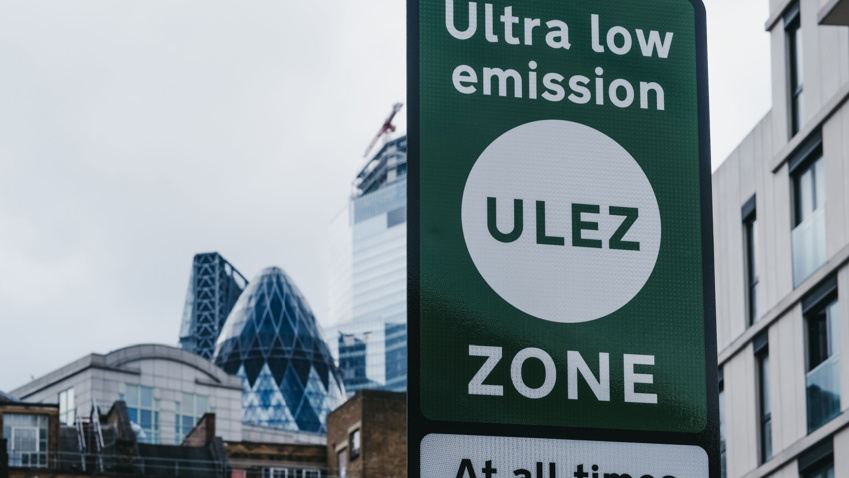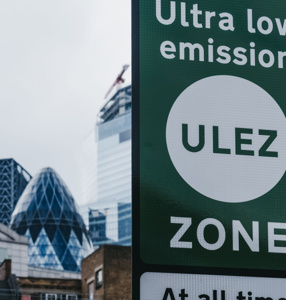
Most of us appreciate clean air and are aware of the health impacts of air pollution. Clean air contributes to better health and wellbeing which, in turn, leads to improved productivity and better economic outcomes. Something that fewer people are aware of though is that evidence shows that cleaner air can also have intergenerational impacts, affecting, for example, educational achievement.
Why is air pollution a problem in UK cities?
Nitrogen oxides (NOx) are a group of gases that are predominantly formed when fossil fuels are burnt, with road transport accounting for 27% of NOx emissions in 2021. That’s why higher concentrations of NO2 are typically found in city areas close to busy roads, often within city centres. Evidence shows that NO2 exposure impacts health in both the short and long-term, exacerbating respiratory conditions such as asthma, and with the potential to increase the chances of developing lung cancer, stroke, and cardiovascular disease. As a result, air pollution negatively impacts the productivity of the UK workforce and the economy, as well as adding an economic burden to the healthcare system.
A policy solution: Clean Air Zones
There is a range of policy options the UK Government has considered to tackle air pollution, but evidence shows that Clean Air Zones (CAZ) are the most effective measure to reduce NO2 levels within the legal limits in the shortest possible time. CAZs are areas in a city where targeted action has been put in place to improve air quality, for example by issuing the most polluting vehicles a daily charge to deter them from driving into the inner city. Following a government mandate in 2017, several cities in the UK have already implemented CAZs, including London, Birmingham, Sheffield and Portsmouth.
Building on the congestion charge introduced earlier, the CAZ in London, known as the Ultra-Low Emissions Zone (ULEZ) has contributed to a 46% reduction in NO2 concentration levels within the city centre since 2019 and a 21% reduction within inner London. In Birmingham, where a CAZ was introduced in June 2021, a study found that after six months NO2 levels fell by 13% in comparison to 2019 data. Despite the positive impacts of these schemes, air pollution is still above legal limits in many areas and further action is needed.
Cleaner air improves health – what about the economy?
A 2020 CBI Economics study, commissioned by the Clean Air Fund, applied innovative methodologies and an in-house model to estimate the significant health and economic benefits to local areas of reducing NO2. In London, an expansion of the ULEZ is estimated to reduce NO2 by an additional 28%, which could prevent over 600 deaths and save over 1,300 days of hospitalisation due to respiratory conditions each year in London.
While most of the health impacts of air pollution affect non-working individuals, in particular the elderly, it also has a large impact on the working population. We estimated that health improvements from reduced air pollution could add up to 2.5 million working hours each year through increased workforce participation and productivity, boosting the economy by more than £48 million in Gross Value Added (GVA).
In other cities explored in the research, such as Sheffield, Portsmouth, Bristol, and Birmingham, a 16-17% reduction in NO2, is estimated to reduce deaths from respiratory conditions by 4-5%. The improved workforce participation and associated positive economic impacts, are estimated to increase GVA between £0.5 million in Portsmouth to £2.7 million in Birmingham.
The improved air quality also benefits local communities and workers in the unpaid or volunteering sector, which this study did not explore. The study highlighted other sources of pollution in cities, such as small particulate matter (PM2.5) that CAZs may also help to reduce. Therefore, the magnitude of the impacts of CAZs is likely to be even larger.
Expanding the ULEZ can be the driver of both healthier and more prosperous cities, benefiting the economy and wellbeing of residents and visitors. However, it doesn’t come without costs, especially for lower-income drivers. Further analysis into the extent and characteristics of these costs is needed, in addition to other policies to change driving behaviours and reduce the number of fossil fuel cars on the road, while ensuring that public transportation and electric car infrastructure provides sustainable and healthier travel.
About CBI Economics
At CBI Economics we have a team of dedicated economists with wide-ranging experience in evidencing policy recommendations. We can help you calculate the fiscal costs of your policy ideas, demonstrate their economic impact, and even help you to best articulate the issues you face through economic evidence. To know more about our work on the health and economic impacts of cleaner air in the UK, you can access our reports here. You can find out more about our services here and get in touch here.





